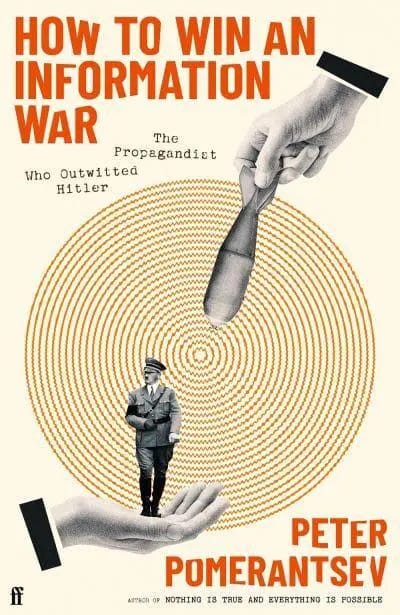How To Beat Disinformation: Peter Pomerantsev On the Man Who Tricked Nazi Germany
I dug up an old thread for you from journalist Peter Pomerantsev’ book on the propagandist who outwitted Hitler
***Please take out a membership to support the light of truth.***
I finally had a good cry today. Thankfully, I was on the phone with an ally from Europe who reminded me what I always remind others: there are opportunities in new beginnings, even those we didn’t chose.
The waterworks came when I was thinking about my father, coming over from Germany, the first and only member of his family to make the move to America — his dream, always. His first stop was Canada, where the local Toronto newspaper reported on his sterling exam results.
After receiving a letter from the “citizenship advisor saying he had written the only perfect examination paper among 6,000 papers,” my dad was interviewed by the newspaper. He is quoted as saying he read a “great number of English books. It is the best way to learn English.”
I learned about this period of my dad’s life when I visited an aunt in Munich, who kept the clipping from the newspaper taped to a wall in her hallway in sort of a makeshift shrine to her baby brother.
I thought of my dad departing Canada for Chicago, and then Chicago for San Francisco, where I had the blessing of growing up. (Below, Daddy on a train.)
America was the hope for young men like him, who immigrated from war-scarred countries.
Will America ever become a dream again or will it continue its descent into a dystopian nightmare…
As I always say, the future is unwritten, and I spent the day writing about examples of successful non-violent Resistance. I will share the report with you here from my upcoming Hot Type column in Byline Supplement. The title of my column comes from my dad’s trade, as I documented here.
How To Beat Disinformation
Because I am always seeking simple solutions to our complex problems, I dug up this old thread for you, based on a Peter Pomerantsev report in The Guardian
When I was in Washington DC earlier this year for Tedx Mid-Atlantic, I had the opportunity to thank Pomerantsev for all his work. The UK-based reporter specializes in dissecting propaganda and has helped me enormously in my work. He even helped me find a bridge to reality when interviewing people on Freedom Corner in DC.
I find his work so helpful, I have transcribed entire interviews with him to give you good information.
Although Pomerantsev is famous for writing the books Nothing Is True and Everything Is Possible and This Is Not Propaganda, it’s his latest book I want to share with you today.
How To Win An Information War is about a man who tricked Nazi Germany and offers lessons from the past on how to beat disinformation. It’s the story of the British man — Thomas Sefton Delmer — who took on Hitler’s information machine during the summer of 1941, when claims that Hitler was dangerous had little impact against the onslaught of Nazi propaganda.
From the Amazon book summary:
“Except for the broadcasts of someone called Der Chef, a German who questioned Nazi doctrine. He had access to high-ranking German military secrets and spoke of internal rebellion. His listeners included German soldiers and citizens, as well as politicians in Washington DC who were debating getting into the war. And--most importantly--Der Chef was a fiction. He was a character created by the British propagandist Thomas Sefton Delmer, a unique weapon in the war.
Then, as author Peter Pomerantsev seeks to tell Delmer's story, he is called into a wartime propaganda effort of his own: the US response to the invasion of Ukraine. In flashes forward to the present day, Pomerantsev weaves in what he's learning from Delmer as he seeks to fight against Vladimir Putin's tyranny and lies. This book is the story of Delmer and his modern investigator, as they each embark on their own quest to manipulate the passions of supporters and enemies, and to turn the tide of an information war, an extraordinary history that is informing the present before our eyes.
The following is snippets from my Twitter thread on March 3, 2024, which was derived from Pomerantsev’s Guardian report:
Delmer wanted to alienate people from Nazi propaganda by pushing Nazi propaganda ‘one step further into the ridiculous…’
Delmer wanted to break through and engage audiences that had come under the sway of the Nazis, and find the cracks that split them from the party…
His first effort claimed to be a pirate radio station, hosted by a foul-mouthed German officer known simply as Der Chef…
This racist patriot spewed stories about the scurrilous activities of Nazi officials, ranting about their sadomasochistic orgies. This pornography helped lure in listeners and broke taboos about insulting Nazi officials. In a more subtle way, it dramatised and mocked how nazism tapped into the psychological allure of submission and domination…
Rather than produce moral and “rational” media, Delmer wanted to undermine the Nazi’s monopoly over people’s strongest, most violent urges. Then he turned the propaganda back on to the Nazis: “Our stories were peopled with Burgomasters, District Leaders, Local group leaders,” he explained. “We spread over them a slime of obloquy as foul as that which they themselves had spread over the Jews”…
Delmer’s aim was not to replace one violent movement with another...
Instead, he wanted to alienate people from Nazi propaganda by, as he explained to the king when he presented his work, pushing Nazi propaganda “one step further into the ridiculous”…
This wasn’t quite satire – people were meant to believe Der Chef was a genuine soldier hiding somewhere inside German-held territory. And satire doesn’t always do much to undermine the hold a leader has on his followers: satirists who mock Trump or Brexit might make their own audiences feel good but don’t necessarily reach the other side…
Delmer understood the need to engage people around their own interests rather than what you might like them to care about, and this is a lesson Ukrainian info warriors have been learning in their war with Russia. Ukraine is full of advertisers and hackers, activists and journalists all trying to reach Russian audiences…
They buy ads on Russian pornography sites and bootleg movie portals or use cold calling software more familiar from marketing campaigns. Early on they found that “moral” content didn’t take off. When they made mass telephone calls to Russians, they found that some 80% would hang up during the first 20 seconds if the calls were about war crimes, but only 30% hung up when the call focused on their personal interests, such as a special tax they had to pay to support Russia’s newly occupied lands…
But though Delmer’s first station was a success, with some sources in Europe even claiming it was the most listened-to station in Germany, it didn’t take long for the Nazis to work out that it was the British who were behind it. They began calling it out publicly, using it as an example of how dastardly the British propaganda was. Indeed, here is one (of many) negative lessons from Delmer’s work. Then, as now, creating “sock puppet” media – media that pretend to be one thing but are actually another – can backfire.
People are most susceptible to conspiracy theories when they don’t feel they have any agency or influence over their lives
As he expanded his war work, Delmer changed tactics. When he launched his most ambitious station, the Soldatensender Calais, it was still dressed up as if it were a native German military station, combining broadcasts of speeches by Nazi leaders with music and the latest news and gossip from the front that demonstrated all the lies and inequalities soldiers faced. But the aim was no longer to dupe the listener into believing this was a Nazi station – this time the audience was meant to be in on the act. As Peter Wykeham, a colleague of Delmer’s, explained, this station would “(i) afford our German customers an excuse if caught listening, (ii) enable them to justify this dubious activity to themselves”. Yet even though German listeners knew perfectly well the British were behind the station, they listened to it and trusted it. Often today we lament that people only trust the media that represent their social tribe. So how did Delmer pull it off?
Delmer used every research tool at his disposal to understand his audience’s world. Partisan groups in France provided the latest scores from military football matches and information on the cars officers drove. Secret microphones installed in PoW camps picked up on the soldiers’ latest slang and complaints about their higher-ups. A special storage space had to be constructed for the volumes of notes held by Delmer’s archivist, the former leader of the Social Democrats in the Saar region, Max Braun. Delmer’s team had early knowledge of when the RAF would strike a German town so they could warn soldiers if the street their loved ones lived on had been hit and remind them of their right to take leave and help relatives caught under bombardment…
Today it is so much easier to understand what people care about, even in closed societies. You can look at open-source research into corrupt procurement by local government, do sentiment analysis of social media, or use secure messaging apps that allow you to talk directly to people even in the most dangerous areas. The key is always to understand people’s conditions, and be useful to them. Delmer never talked down or lectured – instead he understood the gripes of the soldiers and made them feel part of a community that looked after their interests better than the Nazis…
So what can we draw from the strange, contradictory experience of Delmer’s deeds and misdeeds? Dictators and propagandists inside democracies use hate-spreading troll farms and conspiracy-spewing cable news; target audiences according to their deepest grievances and encourage cruelty…
To compete we need to develop a new generation of democratic media with the same focus, but with different values. This needs to be done at scale…
First, such media has to match the emotional power of authoritarians. Counter-propagandists need their own visceral dramas, YouTubers and the whole spectrum of today’s channels.
They don’t need to hide their provenance like Der Chef, though they may have to give people the necessary “cover” to watch safely if in a dangerous dictatorship. But they do need to delve into the operating theatre of our darkest desires. Think of the difference between the cult leader and the therapist. Both dig into people’s unspoken fears and needs. The cult leader, like the authoritarian propagandist, uses that insight to make people dependent on their power. The therapist helps them to become more empowered and self-aware.
Second, we need to be much more attuned to the needs of audiences – think of media less as dispensing information and more as a social service. We are, by the looks of it, going to be in a long struggle with Russia. Now is the time to start investing in media that engage the parts of society that are critical to their war effort: workers in munitions factories or, most obviously, soldiers. It’s much easier than in Delmer’s time to obtain evidence of what they care about. Last month there was, for example, a large leak of documents from Russia’s military that showed how the leadership lies about losses on the front. The aim is not to make these people, who are often involved in war crimes, “good” – it’s to help win the war by getting them to disobey their orders.
Third, such media need to nurture a sense of community, especially in polarised democracies where there is still a chance of displacing malign propaganda before it reaches total dominance, and where there are audiences up for grabs. Instead of experiencing power through a strongman, this community needs to empower people to act for themselves. There are many small initiatives that already pioneer this. Hearken, for example, is an online platform where users can help media choose which topics they should focus on, taking power away from aloof editors and grounding it in local needs. vTaiwan is another platform whose algorithm helps people find solutions to polarising issues by identifying common ground on which to build policies. Such examples are tiny and experimental, and need to be scaled massively.
Sefton Delmer had as many bad lessons for us as good. But the most fundamental one is related to his sense that all social roles are somehow performed. We have a choice. We can either play the role prescribed by propagandists – which makes us dependent on them. Or we can invent media that welcome people into a relationship where they become active players.
You can’t shove “the truth” down people’s throats if they don’t want to hear it, but you can inspire them to have the motivation to care about facts in the first place.—Peter Pomerantsev, Guardian, March 2, 2024
How to Win an Information War: The Propagandist Who Outwitted Hitler—published by Faber on 7 March 2024. To support the Guardian and Observer, order your copy at guardianbookshop.com.
We are in a long battle, and the good people and the great minds are on our side.
Never lose sight of that.
****
****
Bette Dangerous is a reader-funded magazine. Thank you to all monthly, annual, and founding members.
I expose the corruption of billionaire fascists, while relying on memberships to keep the light on.
Thank you in advance for considering the following:
Share my reporting with allies
Buying my ebooks
A private link to an annual membership discount for older adults, those on fixed incomes or drawing disability, as well as activists and members of the media is available upon request at bettedangerous/gmail. 🥹
More info about Bette Dangerous - This magazine is written by Heidi Siegmund Cuda, an Emmy-award winning investigative reporter/producer, author, and veteran music and nightlife columnist. She is the cohost of RADICALIZED Truth Survives, an investigative show about disinformation and is part of the Byline Media team. Thank you for your support of independent investigative journalism.
🤍
Begin each day with a grateful heart.
🤍








VP Harris needs to initiate a hand recount of the swing states.
Stephen Spoonamore's duty to warn letter:
https://spoonamore.substack.com/p/duty-to-warn-letter-to-vp-harris